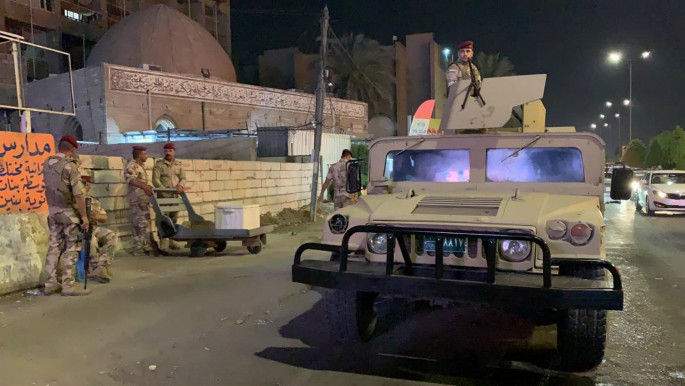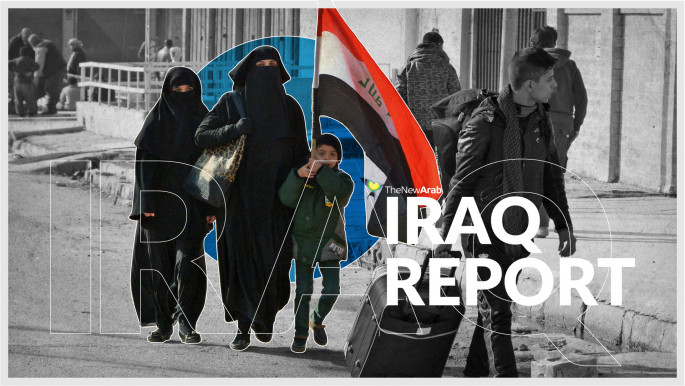The Iraq Report: An outbreak of virus and violence rocks Iraq
While Iraq has been tussling with how to get a handle on a new threat to the country's public health, the country continues to grapple with its endemic problem of violence and government malfunction.
Iraqi policymakers are struggling to contain the novel coronavirus that has ripped through neighbouring Iran, infecting thousands and killing hundreds.
Iraq's exposure to Iran across many spheres of public and private life means that the coronavirus has a potent vector from which it can spread.
As Baghdad tries to get to grips with the latest threat to public health, Iran-sponsored Shia jihadist groups have been blamed by the United States and the United Kingdom for attacks that have claimed the lives of Western soldiers in Iraq.
The US-led coalition took retaliatory action, yet it seems that this tit-for-tat strategy will not resolve until either Washington departs from Iraq and other arenas Tehran wishes to challenge it, or else Iran is discouraged from launching further attacks either through further sanctions or even kinetic action that disrupts the Iranian chain of command.
Coronavirus outbreak refuels street protests
Far from having their spirits dampened by the betrayal of supposedly pro-demonstrator politicians and clerics like Muqtada al-Sadr, or even of being deterred by the potent risks posed by the recent global coronavirus pandemic, Iraqi protesters have made it clear that they are here to stay.
With chants of "they are the virus" filling the air, demonstrators have once again made it clear what they think of their government and the political system that has prevailed over Iraq since the fall of the former dictatorship of Saddam Hussein in 2003.
 |
With chants of 'they are the virus' filling the air, demonstrators have once again made it clear what they think of their government |  |
Anti-government protests have racked the country since October last year and have shown no signs of abating despite a lethal crackdown killing more than 700 demonstrators with thousands more severely injured and arrested.
 |
|
| Read also: Special coverage: How many coronavirus cases are there in the Middle East? |
Some had suspected the protests to die down given the coronavirus pandemic, particularly given the advice of many health professionals to avoid crowds and large public gatherings.
However, Iraqis not only have little faith in the ability of their government to deal with a public health crisis, but they also blame them for the shoddy state the health system finds itself in today.
"Even in normal times our healthcare system is totally run down," said Fatima, a volunteer in central Baghdad's Tahrir Square, the epicentre of the protests.
"Now, on top of everything, we have a coronavirus outbreak, and we are supposed to rely on these facilities?"
Inside medical centres, blood-stained sinks in washrooms and ill-equipped amenities have become a common sight.
Hasan Khallati, a member of the parliament's health committee, insisted to AFP that Iraq's "hospitals and healthcare facilities are fully equipped to deal with the outbreak" of COVID-19.
But available data tells a different story as the World Health Organization says Iraq has fewer than 10 doctors for every 10,000 residents.
Demonstrators have therefore taken public health into their own hands, distributing face masks and hand sanitisers at protest sites and screening the temperatures of any would-be protester in long queues before allowing them entrance to the protests.
"I'm certain the government would love for a widespread infection to blight us because everyone would then be too sick to protest against the corrupt politicians," Luma Naji, one of the protesters, told The New Arab.
"If we don't maintain pressure while also looking after ourselves, then we risk losing momentum if people stay home. And it's not like the government will look after us if we fall ill, so the only thing to do is to keep going until we have authorities who care about our welfare."
Protesters were further enraged after "insensitive" comments by firebrand cleric Sadr who insisted he would not accept any coronavirus vaccine manufactured in "infidel" America. Sadr also stated that he and his supporters would solely "rely on Allah" for a cure.
 |
Protesters were further enraged after 'insensitive' comments by firebrand cleric Sadr who insisted he would not accept any coronavirus vaccine manufactured in 'infidel' America |  |
Amongst other criticisms related to his disregard for the public's safety, some have stated that while Sadr would not be happy to receive a vaccine from the United States, he appeared to be more than happy to have been the recipient of millions of dollars in cash as well as weapons from Iran.
Sadr's comments come hot on the heels of his abandonment of the protest movement, and also further symbolises the rift between Iraqis and the political class that is supposed to lead them.
 |
|
Pro-Iran Shia militants kill Western soldiers
The US-led anti-Islamic State coalition and Iran have butted heads as the proxy war between the two sides heats up once again in Iraq.
 |
|
| Read also: The Iraq Report: US interests face attack in Iraq as tensions with Iran heighten |
A volley of 18 rockets were launched on Wednesday from the back of a truck targeting Camp Taji, a military base housing American and coalition forces north of Baghdad.
The attack claimed the lives of one American soldier, a further US contractor, and a British soldier who was serving as a medical officer in the anti-IS coalition.
A dozen others were also injured.
Read also: US, British soldiers killed in rocket attack on Iraqi base hosting coalition forces
British Foreign Minister Dominic Raab condemned the attacks as "cowardly" and vowed the British soldier, who has now been identified as Lance Corporal Brodie Gillon, would be avenged.
US officials blamed the attacks on Kataib Hezbollah, the pro-Iran Iraqi Shia militant organisation whose leader, Abu Mahdi al-Muhandis, was killed in an American drone strike along with Iranian Islamic Revolutionary Guard Corps Quds Force commander Qasem Soleimani as the New Year came in.
The slaying of Soleimani led to an Iranian missile attack on the Asad Airbase housing coalition troops, leaving 109 American soldiers suffering from "traumatic brain injury".
|
|
While the US denied the attacks in Syria – raising questions that Israel may have conducted the strike on Washington's behalf – it did claim responsibility for a further attack overnight on Thursday, but this time in Iraq.
The Pentagon said that it had targeted five weapons storage facilities belonging to Kataib Hezbollah across Iraq.
"The Iranian proxy group Kataib Hezbollah is the only group known to have previously conducted an indirect fire attack of this scale against US and coalition forces in Iraq," CENTCOM chief General Kenneth McKenzie told a Senate committee.
"The United States will not tolerate attacks against our people, our interests, or our allies," Defence Secretary Mark Esper said. "We will take any action necessary to protect our forces."
Kataib Hezbollah has vowed revenge in what is being seen as a spiral of never-ending violence that will only abate when either side either backs down or comes to a consensus.
 |
Kataib Hezbollah has vowed revenge in what is being seen as a spiral of never-ending violence that will only abate when either side either backs down or comes to a consensus |  |
One possible solution is that the US and Iran come to an agreement about a plethora of issues, including Tehran's nuclear and ballistic missiles programme, as well as its attacks on American allies in the region including Saudi Arabia. However, considering the complexity of the issues involved, this is highly unlikely.
Another way the proxy war may be resolved is if Washington withdraws from Iraq and cedes control entirely to Iran, who is already the most powerful actor in Iraq. This is also unlikely in the short to medium term, as the US views its presence in Iraq to be of vital national security importance.
Finally, the Iranians could be discouraged from launching further proxy attacks by either an increase in sanctions – which has thus far proven to be fruitless – or by launching kinetic action designed to disrupt the command and control of the IRGC and its proxies in Iraq.
The US already has a track record for this when it took out Soleimani, but it is unlikely to do so again for the foreseeable future as even President Donald Trump has made it clear that he does not want war with Iran.
It is therefore likely that we will continue to see violence and proxy warfare being acted out within Iraqi territory and this is unlikely to change any time soon.
The Iraq Report is a fortnightly feature at The New Arab.
Click below to see the full archive.






 Follow the Middle East's top stories in English at The New Arab on Google News
Follow the Middle East's top stories in English at The New Arab on Google News


